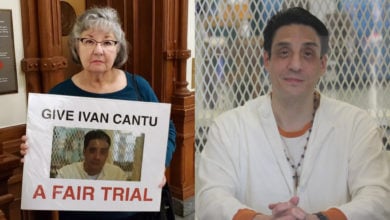A rally gathered in Ramallah this week in solidarity with Maher al-Akhras, a Palestinian political prisoner who after 81 days on hunger strike is now feared to be near death. The 49-year-old father of six was arrested by Israeli forces in July. Al-Akhras’ lawyers have put forth several appeals to Israel’s High Court for his immediate release, most of which have been deferred and remain under review as his situation grows more critical by the day. Medical examiners have determined that nearly three months of hunger strike have left his body with irreversible damage.
With his life on the line and zero evidence provided to substantiate his alleged crime of being a member of a resistance organization, why then does the Israeli military court still hold him in detention?
Al-Akhras’s situation, while alarming, is not unique. Palestinians living under occupation are routinely denied basic rights and are subject to the whims of the Israeli forces. All forms of Palestinian political organization are codified as illegal acts of terror under Israeli law, essentially subjecting all Palestinians who resist occupation by any means to criminal status and detention. Political prisoners are detained on nebulous charges with very little evidence for months on end, all protected under the administrative detention policy.
This broad policy was inherited from the period of British colonial rule which allows Israel to detain Palestinians without charge, trial or sentence. Since Palestinians live under militarized occupation, all cases fall under the jurisdiction of Israeli military courts which have an alarming conviction rate of 99.4 percent, Palestinian civil liberty groups have long protested the administrative detention policy as a complete violation of basic rights.
Long tradition of hunger strikes
For many Palestinian political prisoners, hunger strikes have served as a vital tactic of resistance from behind bars. According to Joe Catron with Samidoun, a Palestinian prisoner solidarity network, “hunger strikes are probably the primary means of struggle for the Palestinian prisoner movement. Historically, these were mass collective hunger strikes which prisoners used to carve out some kind of decent existence for themselves inside prisons.” This includes the ability to speak to other detainees and organize for release.
In 2012, the emergence of individual cases of hunger strikes pioneered by Khader Adnan became a new method of agitation. These struggles were waged around individual cases of detention and calls for release. Palestinian political prisoners like Maher al-Akhras and many others before him have courageously utilized hunger strikes as a tactic of resistance.
With Israel’s refusal to free Al-Akhras as his situation worsens, there has been a massive outpouring of solidarity among Palestinians and around the world. Around 30 other detainees held by Israeli military courts have taken on hunger strikes in support, as well as 80 members of the resistance group Popular Front for the Liberation of Palestine who will begin shortly. As Catron explained, “prisoners’ struggle is a very popular and unifying struggle in Palestine”, largely attributed to the widespread practice of administrative detention, which has impacted roughly 40 percent of Palestinian men at some point in their lives.
As Maher Al-Akhras said to the public through video from his hospital bed, “my death would be a murder by the occupation”. With the intensified mobilization of popular support and mounting international pressure, the hope remains to force Israel’s hand to free Maher Al-Akhras.





